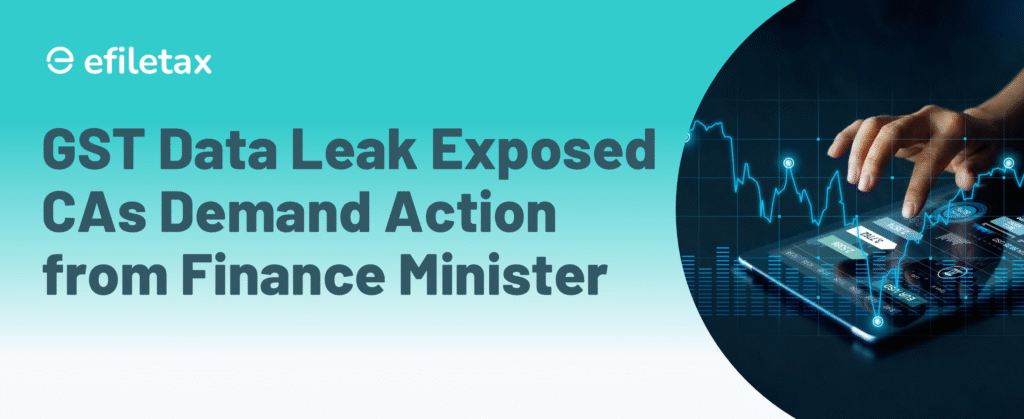
GST Data Leak Scam What Indian Taxpayers Need to Know
A massive GST data leak scam has recently shocked Indian businesses and professionals. Sensitive taxpayer information — including turnover, GSTIN, and filing history — was allegedly sold online. CA associations and tax bodies have now formally urged the Finance Ministry to investigate the breach and take urgent corrective steps.
This blog breaks down the issue, explains how such scams impact taxpayers, and what protections businesses can demand under Indian law.
What is the GST Data Leak Scam?
- Nature of the breach: GST return data of lakhs of traders reportedly sold online without consent.
- Type of data compromised: GSTIN, PAN-linked filings, turnover details, compliance status.
- Alleged sellers: Third-party vendors and private APIs offering bulk GST data for sale.
- Key concern: Unauthorized access and misuse of confidential taxpayer data under GSTN.
How Did the Scam Come to Light?
- Several Chartered Accountant (CA) associations flagged this to the Finance Minister.
- They shared evidence of GST data being available on payment via private platforms.
- The associations highlighted that this violates Section 152 of the CGST Act, which restricts disclosure of taxpayer information collected under GST laws.
- Many fear that this data is being misused for profiling, spam calls, or phishing.
Legal Angle: What Does the CGST Act Say?
| Provision | Legal Clause | Implication |
|---|---|---|
| Data privacy | Section 152, CGST Act | No info can be shared without taxpayer consent |
| Offences & penalties | Section 132 | Unauthorized access or leakage punishable with jail/fine |
| Cybersecurity duty | GSTN Guidelines | GSTN is responsible for system-level data security |
| IT Act, 2000 | Sec 43A & 72A | Compensation for failure to protect personal data |
What Are CA Associations Demanding?
- High-level probe into data access pathways and private APIs.
- Audit of third-party GST tool providers who may be scraping data illegally.
- Stricter implementation of Section 152 and prosecution of offenders.
- Assurance from GSTN on encryption and role-based access controls.
- Public advisory to taxpayers about fraudsters misusing GST credentials.
Expert Tip: How to Protect Your GST Data
🛡️ Don’t share OTPs or login credentials with unknown portals.
🛡️ Use only trusted GST Suvidha Providers (GSPs) or Efiletax for filing.
🛡️ Periodically change GST portal passwords.
🛡️ Avoid clicking on suspicious links claiming to offer GST services.
“Businesses must treat their GST login credentials like bank passwords — never share them casually,” says a senior GST consultant at Efiletax.
What Happens Next?
- The Finance Ministry may seek a report from GSTN regarding the breach.
- Strict action could follow under CGST and IT laws.
- CBIC or GST Council may issue circulars to regulate third-party data access tools.
- Data protection under the upcoming Digital Personal Data Protection Act, 2023 will likely cover this scenario in the future.
FAQs
Q1: Can GSTN share my data with third parties?
A: Not without your consent, as per Section 152 of the CGST Act.
Q2: I got a call claiming they know my GST turnover. What should I do?
A: Report it immediately. Your data might have been leaked. Avoid sharing any more info.
Q3: Are there penalties for unauthorized use of GST data?
A: Yes, under Sections 132 of CGST Act and 72A of the IT Act, misuse of personal data is punishable.
Summary
A shocking GST data leak scam has exposed sensitive taxpayer information online. CA bodies are urging the Finance Minister to act swiftly. Know your legal rights, the protections under CGST and IT laws, and steps you can take to secure your GST credentials today.
Protect Your Business with Efiletax
Worried about GST data misuse? Choose Efiletax — a trusted platform built on secure filing systems, expert tax support, and complete confidentiality.